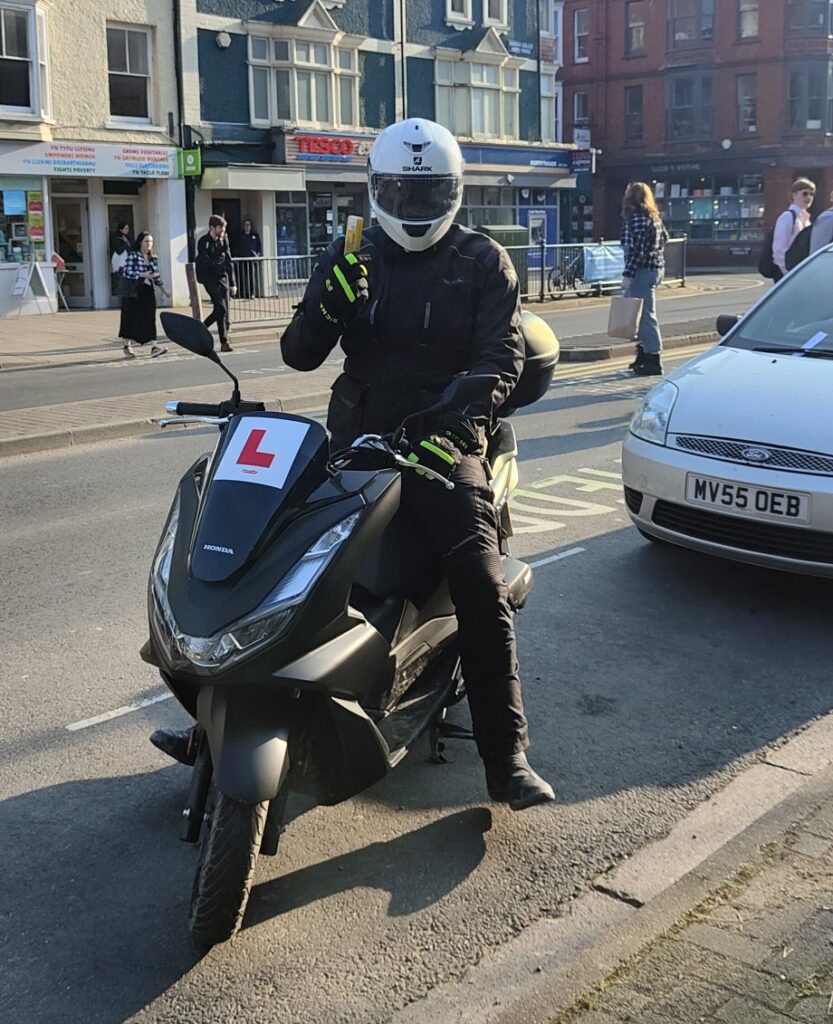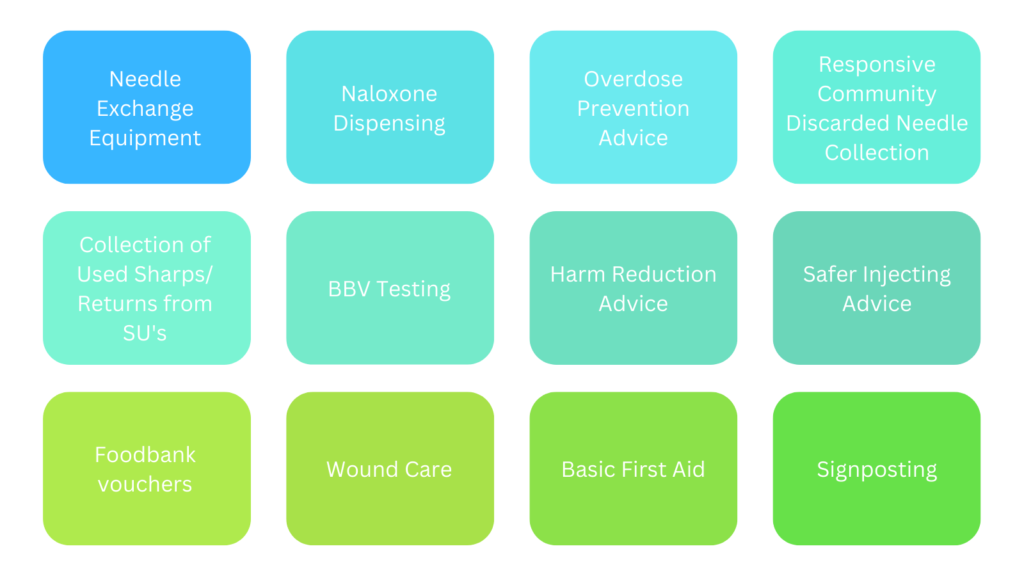As I sat in a rural Carmarthenshire office, a naïve, newly trained drug worker with a passion for all things harm reduction and wanting to change the world – the idea of Spike on a Bike was born.
It was 2010. I had been struggling to find a way of getting clean injecting equipment to a service user of mine who really needed it. Let’s call him Stan. Stan lived in a caravan in one of the most rural areas of Wales on the Ceredigion border. Invitations to appointments were rarely taken up by Stan due to poor access to public transport. It would take one expensive bus fare (that we didn’t reimburse) and a 3-hour return trip to the nearest large town of Carmarthen. That’s a challenge for most of us let alone for Stan who was an agoraphobic hepatitis C positive amputee. The service I worked for at the time wasn’t commissioned to deliver outreach initiatives so I felt like I was failing him. I remember feeling overwhelmed with frustration, powerlessness and a deep desire for transformation to remove the barriers placed in the way of people getting the services they need.
I became lost in thought contemplating ways we could help solve this problem – something a bit out of the box! This had obviously seeped deep into my subconscious as that night, I dreamt of riding motorbikes full of 1ml complete syringes and stericups across the hills and valleys of West Wales, bringing a whole new meaning to the ‘Heart of Wales Line’.
I mentioned my thoughts to my manager at the time and the idea was quickly shot down due to budget constraints and political ‘what ifs’. The same budget constraints and political ‘what ifs’ that we still face today I hasten to add, that fuel stigma of our services and those who use them. So I banished the thought to the back of my brain in the filing system labelled ‘The world isn’t ready yet…’.

Spike on a Bike was launched, across Dyfed, in early 2022 and is the second of its kind in the world. The other, Spikes on Bikes launched in 2016, operates across Vancouver, Canada.
Ten years later in 2020, as I was sat in rural Carmarthenshire, now an experienced harm reductionist and manager, I was trawling through our needle exchange statistics. The COVID-19 pandemic had hit the year before and I was seeing the devastating impact of how this had changed the way people were using our needle exchange services. Enforced lockdowns…fears of contracting the virus…worries of being fined for leaving the home for anything ‘non-essential’…less public transport…deteriorations in people’s mental and physical health…all of this was contributing to a worrying trend.
- 39% less needle exchange transactions
- 34% less people using our needle exchanges
- 41% less items of equipment dispensed
All in one year. The first year of COVID-19.
I knew then this would bring our service and others like it a series of challenges. I was concerned about increases in blood borne virus transmission due to people sharing injecting paraphernalia and re-using needles. I was concerned about increased infections due to poor injecting practices and poor hygiene. I was concerned about inadequate wound care due to service users avoiding A&E or their GP surgeries because it was so difficult to get an appointment or that they were afraid of contracting COVID-19. I was concerned about the increase in community-based injecting that was particularly prevalent across rural Dyfed. I was concerned about the increases in overdoses and in drug and alcohol related death, not just in my own community, but across Wales. I was concerned.
So as I was sat there in rural Carmarthenshire, a louder, angrier, straight-talking and more worldly leader in the substance use sector – I got the file back out. The world was ready.
The idea for Spike on a Bike was to cater for people just like Stan. It was a service designed with the rurality of Dyfed in mind. Workers on motorbikes would come zooming across the three geographically large counties with all the clean injecting equipment, naloxone and harm reduction advice you needed delivered straight to your door. Fast and for free. Having a service where people don’t even need to leave the house would make it more accessible to those who historically have faced barrier after barrier, which COVID-19 exacerbated further.

A member of the Spike on a Bike team, out delivering needle exchange equipment and naloxone.
I understood that coming to a needle exchange or a substance use service isn’t always easy – whether it be stigma or issues with mobility or rurality. I wanted to make sure that nobody was disadvantaged in terms of accessing a harm reduction service – Spike on a Bike allowed us to level the playing field.
I pitched my idea to our Directors in Barod. Without hesitation, they asked me for a business case and a costing and I found myself tapping away at my keyboard that night well past midnight with unbridled excitement. To my delight, I was given the go ahead within a week.
I drafted in help from colleagues to ensure we had thought of everything possible. ‘My’ dream quickly became ‘ours’. I was fortunate enough to have an experienced motorbike rider in my team. He was instrumental in guiding me about the types of motorbikes we would need, from the training and licences right through to the helmets and clothing. We formed partnerships with a local biking specialist shop that would be our one-stop shop for everything we needed including the servicing and delivery of the bikes. Another colleague, who is a qualified graphic designer built our website and online ordering system and designed the beautiful logo you see in this article. Not to mention the staff who came forward to be our bike riders and deliver the service on the ground. Making the vision a reality became a true team effort.
Spike on a Bike launched in early 2022 as the first service of its kind not only in Wales, not only in the UK but in all of Europe. It offers the following provision:

We are also working with Swansea University on a research project looking at the impact of Spike on a Bike in rural areas and are surrounded by people as passionate about the project as we are.
So why am I sat here in rural Carmarthenshire with another pocketful of dreams writing this article? Not only are we incredibly proud of the innovation of Spike on a Bike and we can’t wait to tell anyone who will listen about it, but I hope this article sends a deeper message.
I hope it speaks to you: the disenchanted substance use worker, the apathetic policy maker, the bureaucratic commissioner – BE BRAVER. Dig out your archived files that are labelled ‘not ready for the world yet’ and share your ideas. If you are a leader, champion and nurture the creative visions of the teams around you and find a way around the budget restrictions and political apprehensions. Be bold, be ambitious, be unrelenting with your dreams…after all, it’s what we ask people like Stan to do every day.
Credit to Marshmellop graphic design and Thunder Road Motorcycles Bridgend.
Siân Roberts works for Barod as their Operations Manager. Siân has worked within the Health and Social Care field for 18 years, dedicating most of her career to the substance use sector. She has worked as a leader and a manager for 12 years having significant experience in service delivery and operations, quality and change management and vision setting. Siân takes pride in living and working with integrity and is values-driven. Sian is passionate about harm reduction and making a difference.

